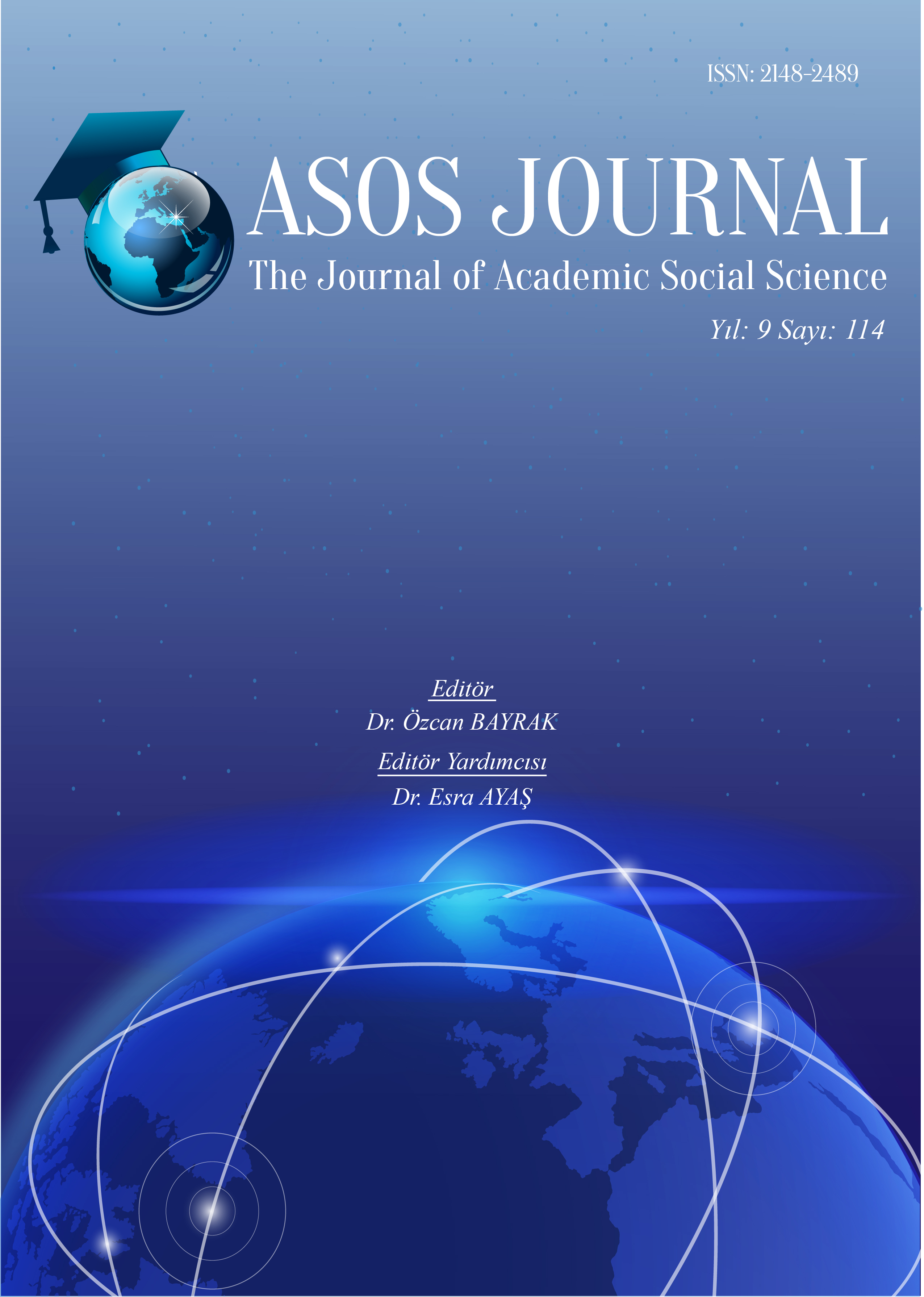Author :
DOI : 10.29228/ASOS.49156
Year-Number: 2021-114
Yayımlanma Tarihi: 2021-03-16 22:21:50.0
Language : Türkçe
Konu :
Abstract
Keywords
Abstract
Keywords
- Anlar, B,; Yalaz, K, (1996), Denver II Gelişimsel Tarama Testi-Türk Çocuklarına Uyarlanması ve Standardizasyonu, Hacettepe Çocuk Nörolojisi Gelişimsel Tıp Araştırmaları Grubu, Ankara.
- Baykan, S,; Temel, ZF,; Ersoy, Ö,; Avcı, N, (2002), Gazi Erken Çocukluk Gelişimi Değerlendirme Aracının (Geçda) Geliştirilme Süreci, Erken Çocukluk Gelişimi Ve Eğitimi Sempozyumu “Geleceğe Bakış” Bildiri Kitabı, Kök Yayıncılık, Ankara.
- Bertan, Münevver,; Haznedaroğlu, Dilek,; Koln, Pelin,; Yurdakök, Kadriye,; Güçiz, Bahar Doğan, (2009), “Ülkemizde Erken Çocukluk Gelişimine İlişkin Yapılan Çalışmaların Derlenmesi (2000-2007)”, Çocuk Sağlığı ve Hastalıkları Dergisi, Y.52, S.1, s.1-8.
- Büyüköztürk, Şener, (2005), Sosyal Bilimler İçin Veri Analizi El Kitabı: İstatistik, Araştırma Deseni Spss Uygulamaları Ve Yorum, Pegem Akademi, Ankara.
- Çağdaş, A,; Şahin Şeçer, Z, (2015), Anne Baba Eğitimi, Eğiten Kitap, Ankara.
- Çokluk, Ö,; Şekercioğlu, G,; Büyüköztürk, Ş, (2010), Sosyal Bilimler İçin Çok Değişkenli İstatistik: Lisrel Ve SPSS Uygulamaları, PegemAkademi, Ankara.
- Demirci, Aylin,; Kartal, Mehtap, (2012), “Çocukluk Dönemine Ait Bir Sorun: Gelişme Geriliği Ve Erken Tanının Önemi”, Turkish Family Physician, Y.3, S.4, s.1-6.
- Demircioğlu, Haktan, (2016), “Sosyal Duygusal Gelişim”, (Ed. Nilgün Metin) Doğum Öncesinden Ergenliğe Çocuk Gelişimi, s.163-196, Ankara.
- Davaslıgil, Ümit, (2016), “Bebeklik Dönemi”. (Ed. Haluk Yavuzer), Ana-Baba Okulu, s.135- 136, İstanbul.
- Gresham, Frank M,; Sugaı, George,; Horner, Robert H, (2001), Interpreting Outcomes Of Social Skills Training For Students With High-İncidence Disabilities, Exceptional Children, Volume 67/3, s.331-344, Amerika.
- Körükçü, Ö, (2019), Gelişim İle İlgili Bilgilerin Eğitime Yansıması. Ed. Aysel Köksal Akyol, Erken Çocukluk Döneminde Gelişim II, s. 417-438, Ankara.
- Kurnaz Adıbatmaz, Fatma Betül,; Özyürek, Arzu, (2019), “Erken Çocukluk Döneminde Gelişimsel Değerlendirmenin Önemi: Geçda Sonuçları Örneği”, Bingöl Üniversitesi Sosyal Bilimler Enstitüsü Dergisi, Y.9, S.18, s.1320-1344.
- Küçükturan, Gülay,; Keleş, Sadiye, (2019), “Sosyal Duygusal Gelişim”, Ed. Aysel Köksal Akyol, Erken Çocukluk Döneminde Gelişim I, s.318-362, Ankara.
- Oktay, A,; Bilgin, H. (2002). Marmara Gelişim Ölçeğinin Geliştirilmesi (3-6 Yaş Dönemi Çocukları İçin). Erken Çocukluk Gelişimi Ve Eğitimi Sempozyumu Bildiriler Kitabı, Kök Yayıncılık, Ankara.
- Saarni, Carolyn, (2001), “Cognition, Context And Goals: Significant Components İn Socialemotional Efffectiveness”, Social Development, Volume 10/1, s.125- 127.
- San-Bayhan, P,; Artan, İ, (2009), Çocuk Gelişimi Ve Eğitimi, Morpa Kültür Yayınları, İstanbul.
- Savaşir, I,; Sezgin, N,; Erol, N, (1995), Ankara Gelişim Tarama Envanteri El Kitabı, Ankara Üniversitesi Tıp Fakültesi, Ankara.
- Şengül, Acar E,; Yükselen, Arzu İpek, (2015), “Bebeklikte Sosyal Ve Duygusal Gelişim”, Ed. Figen Turan, Arzu İpek Yükselen, Çocuk Gelişimi Bebeklik Döneminde Gelişim, s.177-195, Ankara.
- Temel, F,; Ersoy, Ö,; Avci, N,; Turla, A, (2005), Gazi Erken Çocukluk Gelişimi Değerlendirme Aracı “Geçda”, Rekmay Ltd. Şti, Ankara.
- Tunca Yılmaz, Öznur,; Yakut, Yavuz,; Uygur, Fatma,; Uluğ, Naime, (2011), “Tampa Kinezyofobi Ölçeği’nin Türkçe Versiyonu Ve Test-Tekrar Test Güvenirliği”, Fizyoter Rehabil, Y.22, S.1, s.44-49.
